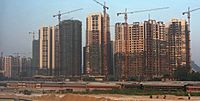
Photo from wikipedia
Abstract Economic growth and urbanization have been adequately studied due to their profound influence on pollution. However, the collective development of economy and urbanization poses a challenging problem in terms… Click to show full abstract
Abstract Economic growth and urbanization have been adequately studied due to their profound influence on pollution. However, the collective development of economy and urbanization poses a challenging problem in terms of reducing CO 2 emissions. One of the prerequisites for solving this problem is to examine the simultaneous impacts of economic growth and urbanization on CO 2 emissions. Within an extended STIRPAT framework, the present study aims to thoroughly investigate the combined nonlinear effects of economic growth and urbanization on CO 2 emissions using provincial panel data from China that spans the period of 1997–2016. Considering the heterogeneity and dynamicity across the panel, this is the first attempt to comprehensively explore the selected variables and the CO 2 emissions nexus by building a new two-way fixed-effects panel data partially linear additive model. The results show an inverted “U-shaped” nonlinear impact of economic growth on CO 2 emissions, but urbanization has a different influence, revealing a “roller coaster” pattern with three turning points. The results also suggest that the factor of energy consumption will lead to an increase in CO 2 emissions, while technology diffusion and industrial upgrading can facilitate the reduction of CO 2 emissions. To provide an in-depth understanding of these impacts, nonlinear marginal analyses are performed at different stages of socioeconomic advancement. In addition, the consistency of the empirical results and the merits of the suggested method are corroborated by the different estimation techniques. The conclusion recommends that the evaluation of carbon pollution needs to be heightened by further research from multidimensional perspectives, and the concepts of green production and low-carbon development should be promoted to achieve the sustainable goals of the whole society.
Journal Title: Energy
Year Published: 2019
Link to full text (if available)
Share on Social Media: Sign Up to like & get
recommendations!